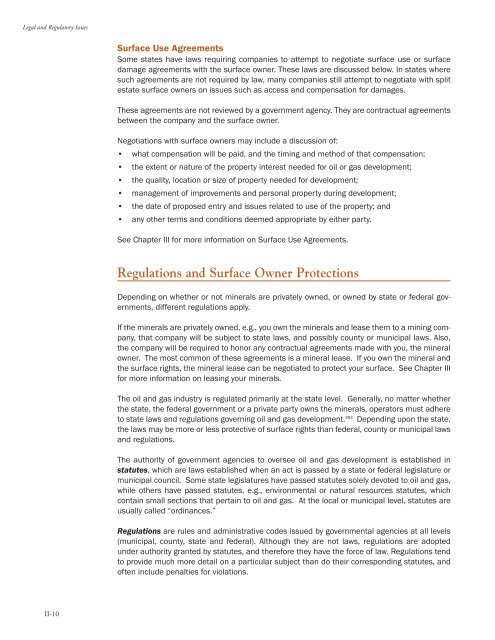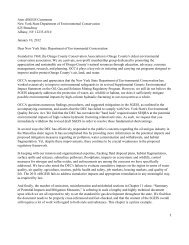Oil and Gas at Your Door? (2005 Edition) - Earthworks
Oil and Gas at Your Door? (2005 Edition) - Earthworks
Oil and Gas at Your Door? (2005 Edition) - Earthworks
You also want an ePaper? Increase the reach of your titles
YUMPU automatically turns print PDFs into web optimized ePapers that Google loves.
Legal <strong>and</strong> Regul<strong>at</strong>ory Issues<br />
Surface Use Agreements<br />
Some st<strong>at</strong>es have laws requiring companies to <strong>at</strong>tempt to negoti<strong>at</strong>e surface use or surface<br />
damage agreements with the surface owner. These laws are discussed below. In st<strong>at</strong>es where<br />
such agreements are not required by law, many companies still <strong>at</strong>tempt to negoti<strong>at</strong>e with split<br />
est<strong>at</strong>e surface owners on issues such as access <strong>and</strong> compens<strong>at</strong>ion for damages.<br />
These agreements are not reviewed by a government agency. They are contractual agreements<br />
between the company <strong>and</strong> the surface owner.<br />
Negoti<strong>at</strong>ions with surface owners may include a discussion of:<br />
• wh<strong>at</strong> compens<strong>at</strong>ion will be paid, <strong>and</strong> the timing <strong>and</strong> method of th<strong>at</strong> compens<strong>at</strong>ion;<br />
• the extent or n<strong>at</strong>ure of the property interest needed for oil or gas development;<br />
• the quality, loc<strong>at</strong>ion or size of property needed for development;<br />
• management of improvements <strong>and</strong> personal property during development;<br />
• the d<strong>at</strong>e of proposed entry <strong>and</strong> issues rel<strong>at</strong>ed to use of the property; <strong>and</strong><br />
• any other terms <strong>and</strong> conditions deemed appropri<strong>at</strong>e by either party.<br />
See Chapter III for more inform<strong>at</strong>ion on Surface Use Agreements.<br />
Regul<strong>at</strong>ions <strong>and</strong> Surface Owner Protections<br />
Depending on whether or not minerals are priv<strong>at</strong>ely owned, or owned by st<strong>at</strong>e or federal governments,<br />
different regul<strong>at</strong>ions apply.<br />
If the minerals are priv<strong>at</strong>ely owned, e.g., you own the minerals <strong>and</strong> lease them to a mining company,<br />
th<strong>at</strong> company will be subject to st<strong>at</strong>e laws, <strong>and</strong> possibly county or municipal laws. Also,<br />
the company will be required to honor any contractual agreements made with you, the mineral<br />
owner. The most common of these agreements is a mineral lease. If you own the mineral <strong>and</strong><br />
the surface rights, the mineral lease can be negoti<strong>at</strong>ed to protect your surface. See Chapter III<br />
for more inform<strong>at</strong>ion on leasing your minerals.<br />
The oil <strong>and</strong> gas industry is regul<strong>at</strong>ed primarily <strong>at</strong> the st<strong>at</strong>e level. Generally, no m<strong>at</strong>ter whether<br />
the st<strong>at</strong>e, the federal government or a priv<strong>at</strong>e party owns the minerals, oper<strong>at</strong>ors must adhere<br />
to st<strong>at</strong>e laws <strong>and</strong> regul<strong>at</strong>ions governing oil <strong>and</strong> gas development. 393 Depending upon the st<strong>at</strong>e,<br />
the laws may be more or less protective of surface rights than federal, county or municipal laws<br />
<strong>and</strong> regul<strong>at</strong>ions.<br />
The authority of government agencies to oversee oil <strong>and</strong> gas development is established in<br />
st<strong>at</strong>utes, which are laws established when an act is passed by a st<strong>at</strong>e or federal legisl<strong>at</strong>ure or<br />
municipal council. Some st<strong>at</strong>e legisl<strong>at</strong>ures have passed st<strong>at</strong>utes solely devoted to oil <strong>and</strong> gas,<br />
while others have passed st<strong>at</strong>utes, e.g., environmental or n<strong>at</strong>ural resources st<strong>at</strong>utes, which<br />
contain small sections th<strong>at</strong> pertain to oil <strong>and</strong> gas. At the local or municipal level, st<strong>at</strong>utes are<br />
usually called “ordinances.”<br />
Regul<strong>at</strong>ions are rules <strong>and</strong> administr<strong>at</strong>ive codes issued by governmental agencies <strong>at</strong> all levels<br />
(municipal, county, st<strong>at</strong>e <strong>and</strong> federal). Although they are not laws, regul<strong>at</strong>ions are adopted<br />
under authority granted by st<strong>at</strong>utes, <strong>and</strong> therefore they have the force of law. Regul<strong>at</strong>ions tend<br />
to provide much more detail on a particular subject than do their corresponding st<strong>at</strong>utes, <strong>and</strong><br />
often include penalties for viol<strong>at</strong>ions.<br />
II-10




